News
Published 11 November 2025Researchers celebrated at 2025 Research Honours Aotearoa events
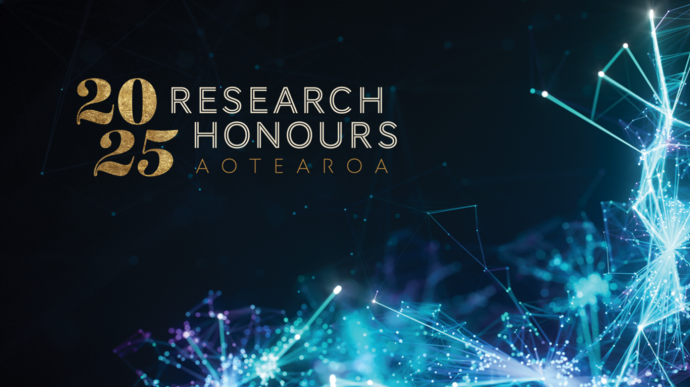
The Society is holding three regional award ceremonies this year to recognise researchers, scholars, and innovators throughout Aotearoa New Zealand who have achieved excellence in their chosen fields. Prestigious Awards are presented by the Royal Society Te Apārangi and the Health Research Council of New Zealand.
2025 Research Honours Aotearoa award recipients
Whanganui-a-Tara Wellington awards:
- Early Career Research Excellence Award for Social Sciences: Ayca Arkilic
- Early Career Research Excellence Award for the Humanities: Patrick Savage
- Te Kōpūnui Māori Research Award: Helena Abolins-Thompson
- Hamilton Award: Mathew Anker
- Pou Aronui Medal: Reuben Collier
- Hutton Medal: Dennis Gordon
- Rutherford Medal: Wickliffe Abraham
- Te Ata Hāpara Award: Angelique Reweti
Tāmaki Makaurau Auckland awards:
- Hatherton Award: Sofia Rauzi
- Fleming Medal: Rochelle Constantine
- Te Rangi Hiroa Medal: Tahu Kukutai
- Durie Medal: Chris Sibley
- MacDiarmid Medal: Leo Cheng
- Hector Medal: Christian Hartinger
- Callaghan Medal: Margaret Stanley
- Thomson Medal: Carolyn (Kim) King
- Beaven Medal: Alice Theadom and group
- Te Tohu Rapuora Medal: Paora Moyle
Ōtautahi Christchurch awards:
- Humanities Aronui Medal: Jacinta Ruru
- Te Rangaunua Hiranga Māori Medal: Te Kāhui-a-Te-Rū-Rangahau
- Scott Medal: Brendon Bradley
- Pickering Medal: Aaron Marshall
- Catalyst in the Community Award: Te Rūnanga o Ōtākou Taurite Tū Limited
- Beaven Medal: Ben Wheeler, Martin de Bock and team
- Liley Medal: Logan Walker
2025 Research Honours Aotearoa – Te Whanganui-a-Tara Wellington, Tuesday 11 November
View photographs from the evening >
View speech by Her Excellency The Right Honourable Dame Cindy Kiro GNZM QSO, Governor-General of New Zealand, Patron of the Royal Society Te Apārangi.
Awards presented by the Royal Society Te Apārangi
Early Career Research Excellence Award for Social Sciences
This award recognises emerging researchers who have demonstrated exceptional promise in the social sciences.
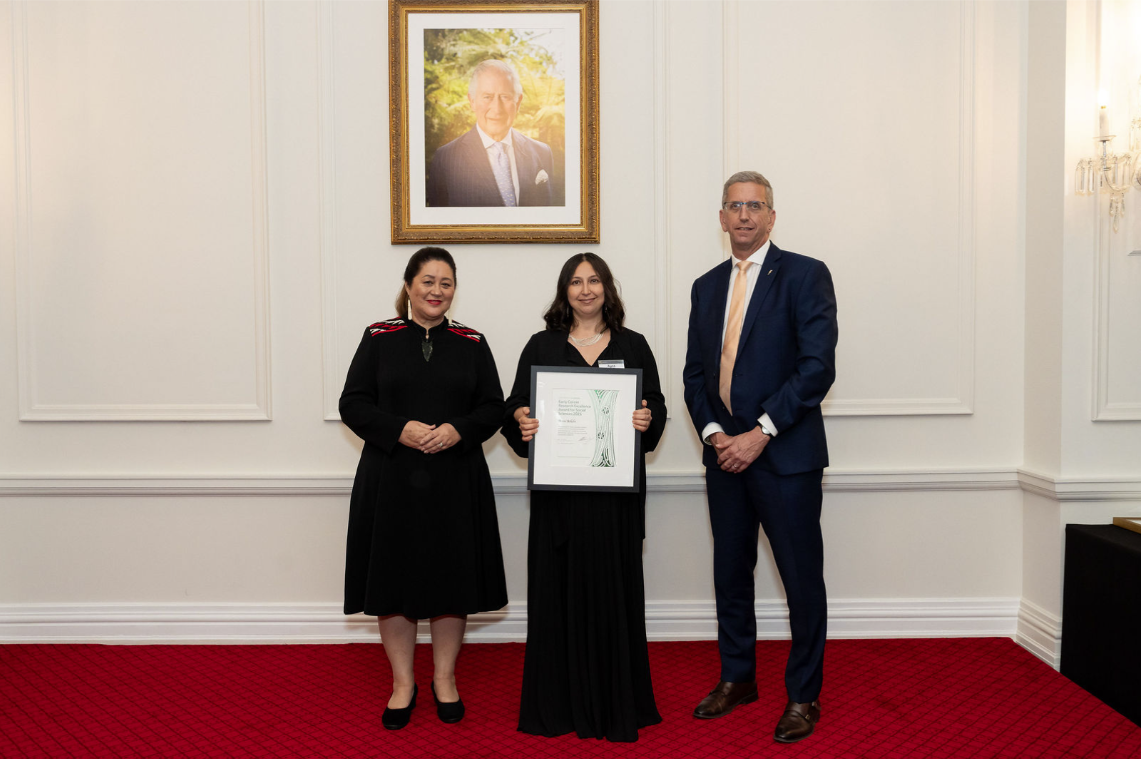
Dr Ayca Arkilic, of Te Herenga Waka – Victoria University of Wellington, has won the Early Career Research Excellence Award for Social Sciences for her research on women who converted to Islam after the 2019 Christchurch mosque attack.
In the context of increasing conversions to Islam in Aotearoa, especially after the attack, Ayca’s nationwide ethnographic fieldwork has focused on the experiences of Māori and Pākehā Muslim converts from an interdisciplinary political science perspective. Her most recent output from this project specifically looks at women’s experiences.
She has investigated how and why women have converted to Islam, and with what consequences for their citizenships, identities, and everyday challenges. Her research has found that Māori women who have converted feel more vulnerable than others, and report having their identities and belonging questioned more frequently.
Ayca’s work also covers the effects on national identity, social cohesion, and demographics for Aotearoa. She has already achieved international recognition through her many publications and advisory services to governments and other organisations. She also excels in teaching, mentoring, and community engagement.
“I am indebted to women converts all around Aotearoa for trusting me and sharing their stories.”
– Ayca Arkilic
Read media release about this prize >
Early Career Research Excellence Award for the Humanities
This award recognises emerging researchers who have demonstrated exceptional promise in the humanities.
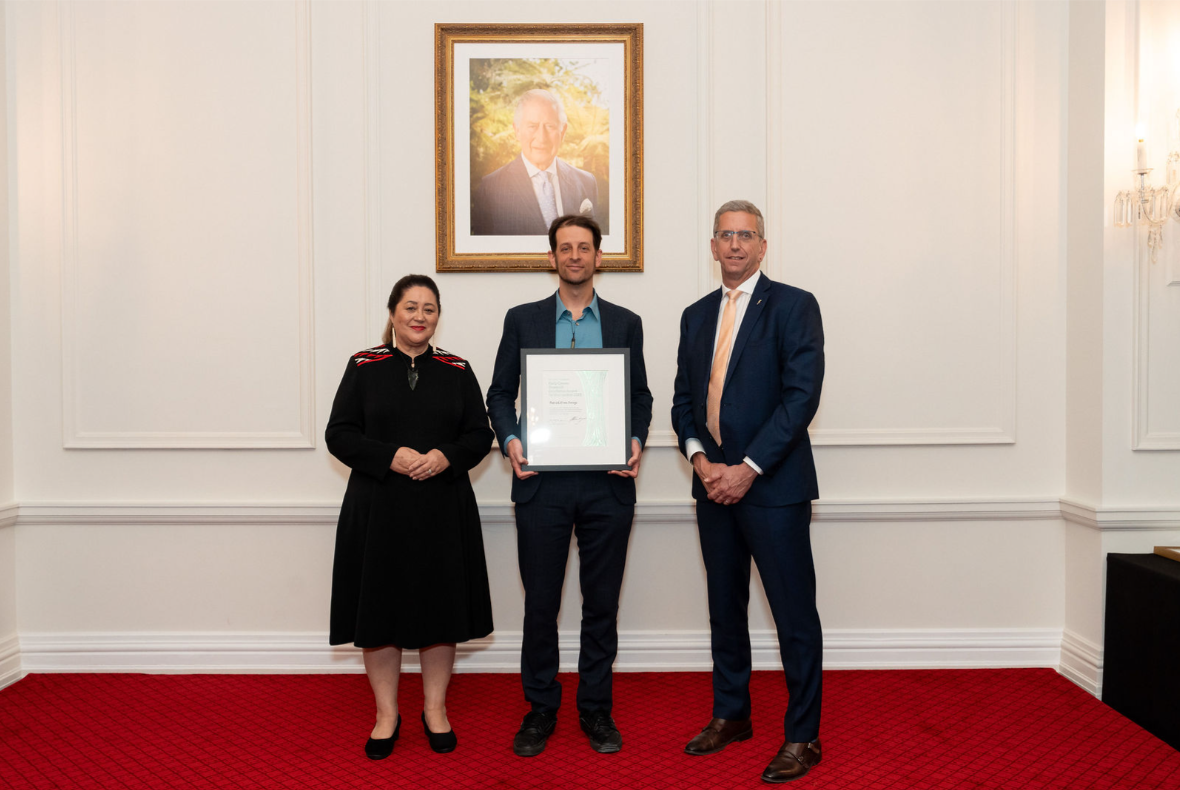
Dr Patrick Savage of Waipapa Taumata Rau – the University of Auckland has won the Early Career Research Excellence Award for the Humanities for his interdisciplinary research on the relationships between music and language in different cultures.
The paper he led in collaboration with 74 other researchers, Globally, songs and instrumental melodies are slower and higher and use more stable pitches than speech: A registered report, has generated international acclaim and media coverage from the likes of The New York Times and Scientific American.
Patrick has led collaborative research by diverse teams of psychologists, computer scientists, ethnomusicologists, professional musicians, and culture-bearers from around the world.
This research has found differences between music and speech that are consistent across cultures, providing evidence for the universality of music, its cultural and biological evolution, and its functions, including social bonding. Patrick aims to promote and preserve cultural heritage and Indigenous knowledge by working with communities to codesign his research questions and methods.
“Our new findings suggest that music does indeed have some unique qualities that may help bond us together better than language can, an idea also supported by preliminary data from our follow-up studies.”
– Patrick Savage
Read media release about this prize >
Te Kōpūnui Māori Research Award
For an early-career Māori researcher for innovative research with the potential for significant impact.
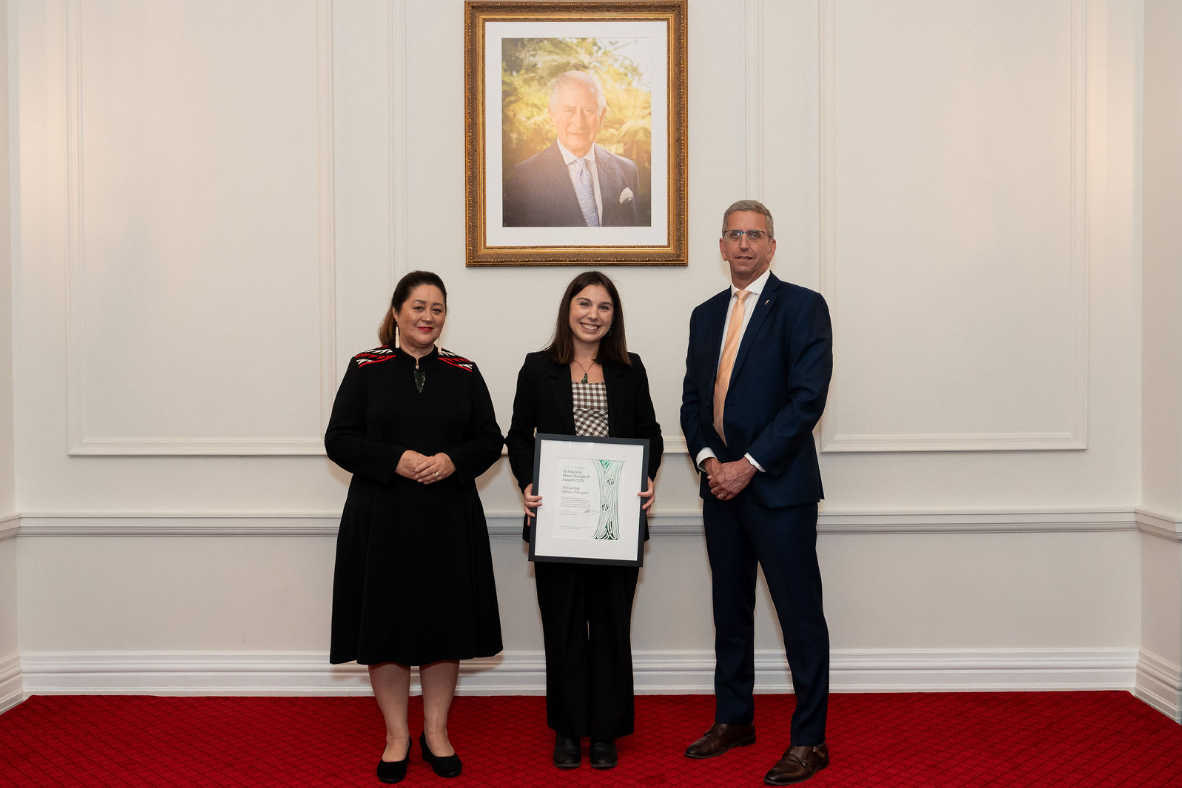
Helena Abolins-Thompson (Ngāti Toarangatira, Ngāi Tahu), of Ōtākou Whakaihu Waka – the University of Otago (Wellington), has won Te Kōpūnui Māori Research Award for her research which integrates community collaboration and Indigenous worldviews into an ethical framework for biomedical research, promoting equitable health outcomes by ensuring representation of Indigenous people in scientific datasets.
Helena’s most recent study focused on cancer and cardiovascular diseases in Māori women. She developed culturally informed practices to obtain samples of human tissues from these wāhine Māori. She created 3D models of tumour organoids from some samples, to enable screening of potential therapies for cancers. RNA from cells in other samples was sequenced, using advanced next-generation techniques, to aid development of personalised medicines for Māori women that target the relevant genes.
One of the aims of this research was to highlight how standard healthcare practices can be adapted to be culturally appropriate through use of tikanga. Helena is redefining translational research with and for Indigenous communities and connecting to Indigenous research networks around the world.
“The goal of this work was, therefore, to increase Māori representation in advanced scientific datasets that inform treatment, particularly in the context of personalised treatment options, as just one way of working towards equitable health outcomes for Māori.”
– Helena Abolins-Thompson
Read media release about this prize >
The Hamilton Award
The Hamilton Award is presented to an early-career researcher for excellence in scientific research.
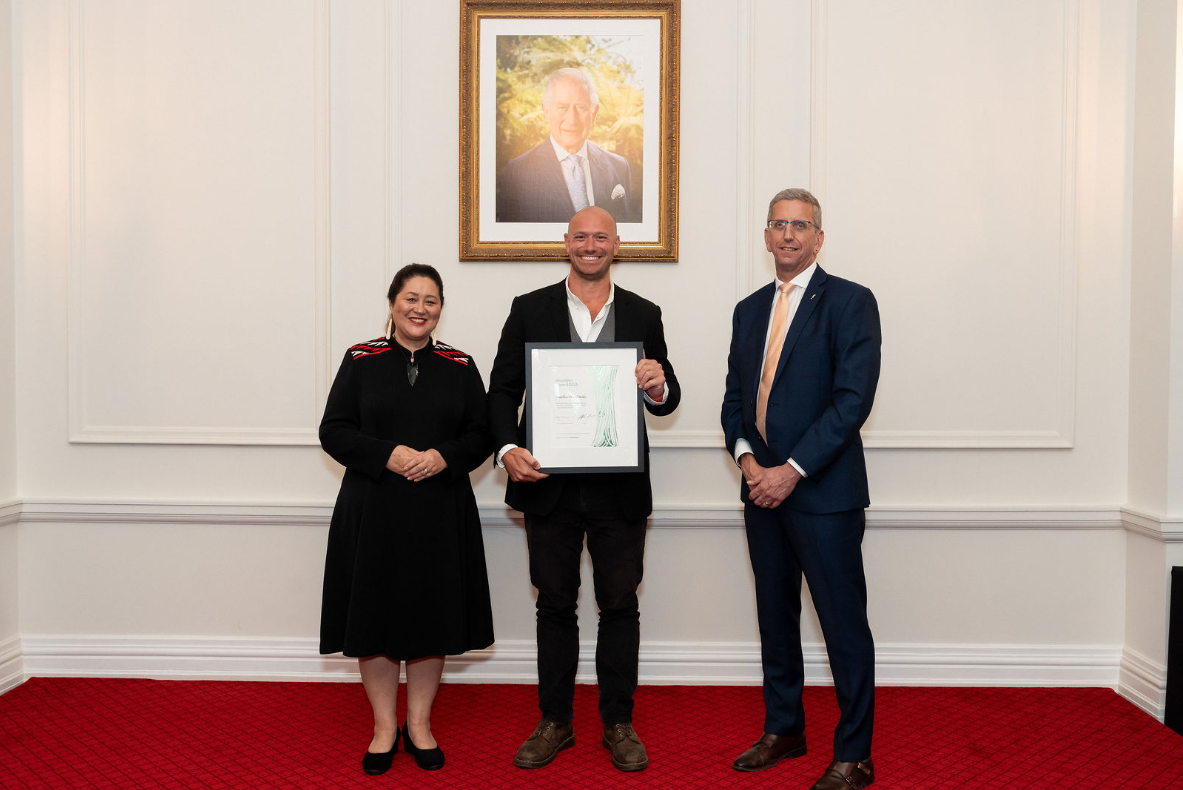
Dr Mathew Anker, of Te Herenga Waka Victoria – University of Wellington, has received the Hamilton Award for achieving a chemical reaction thought to be impossible – the four-electron reduction of benzene – enabling a range of useful applications.
Quantum mechanics predicts that adding four excess electrons to the molecule benzene and incorporating metal atoms will create materials with remarkable properties that can be used in new technologies for magnetic data storage, spintronic devices, and quantum computers.
Until now, making these benzene tetra-anions, and manipulating them in materials, has been extremely difficult because of the highly stable nature of the benzene molecule.
Mathew and his team discovered a simple and accessible method to incorporate benzene tetra-anions with metals into materials, bringing revolutionary applications a step closer to reality and opening a new area of benzene-reduction chemistry.
“New Zealand has a strong history of lanthanide materials research and is helping to push the world forward in these types of technologies.”
– Mathew Anker
Read media release about this prize >
The Pou Aronui Medal
The Pou Aronui Medal is presented for distinguished service and sustained contributions to the field of humanities.
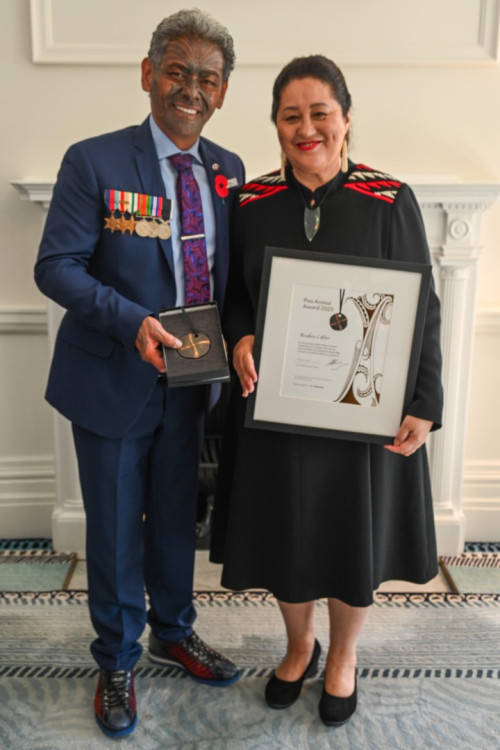
Dr Reuben Collier MNZM (Horouta, Mataatua, Te Arawa, Tainui) of Te Whare Wānanga o Awanuiārangi has received the Pou Aronui Award for distinguished service and sustained contribution to the humanities.
He is recognised for documentary filmmaking, academic leadership, and visionary work that have advanced Māori language, culture, and historical memory, strengthened Indigenous knowledge and research, and helped shape Aotearoa New Zealand’s national identity.
His career bridges media, academia, and public service. Internationally acclaimed for directing Tangi ki Te Arikinui, the state funeral broadcast for Te Arikinui Dame Te Atairangikaahu, Reuben brought Indigenous ceremonial practice to global audiences with dignity and authenticity.
Equally defining is his enduring engagement with the 28th (Māori) Battalion through landmark documentaries, commemorative journeys, and expert testimony to the Waitangi Tribunal’s Military Veterans Inquiry.
As an academic, he developed Tohu, a Whakaaro Māori research framework expressed as spatial epistemology, which has transformed doctoral education and advanced Indigenous scholarship internationally.
“I felt a deep responsibility to ensure that Māori language, tikanga, and lived histories would not fade into silence or fragmented memory.”
– Reuben Collier
Read media release about this prize >
The Hutton Medal
The Hutton Medal is presented for work of outstanding scientific or technological merit on animal, earth, or plant sciences.
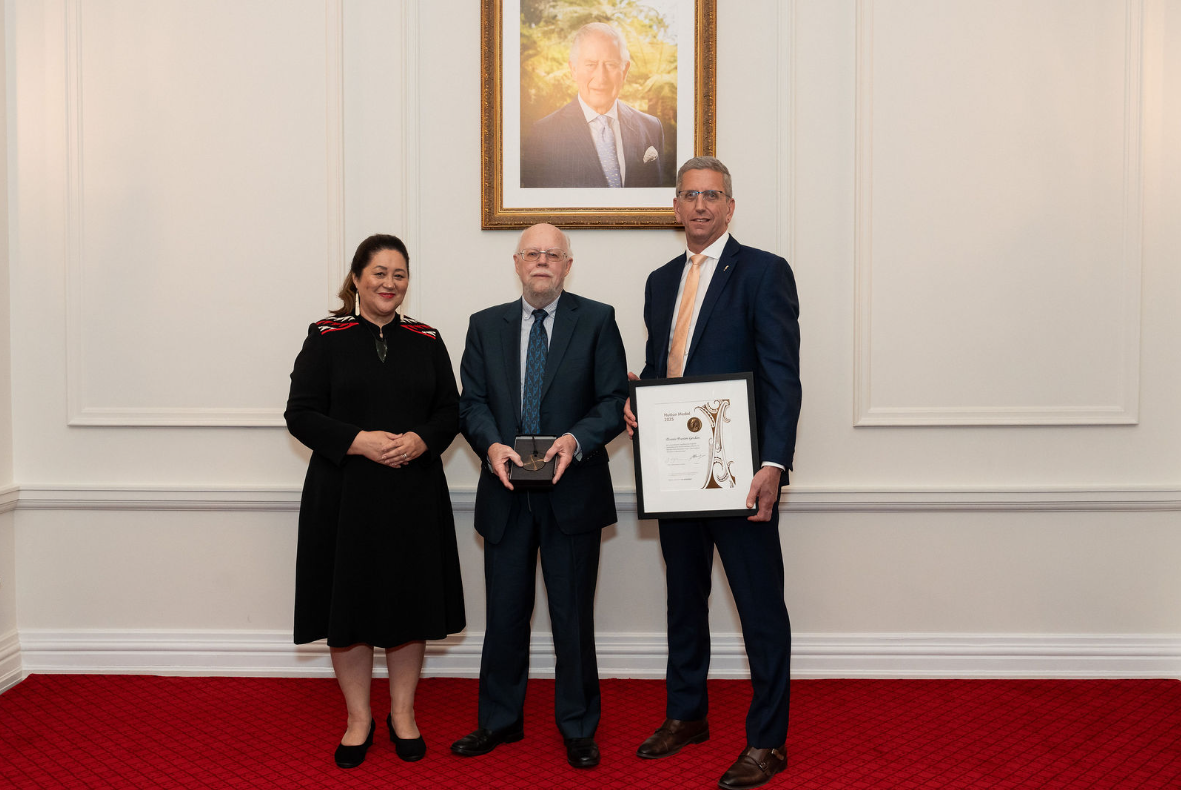
Dr Dennis Gordon, an Emeritus Researcher at Earth Sciences New Zealand, has been awarded the Hutton Medal for extraordinary contributions to global taxonomy, as the world’s leading authority on Bryozoa, and for publication of the New Zealand Inventory of Biodiversity.
Bryozoans are common marine invertebrate animals that form colonies with calcium carbonate on a variety of surfaces, including rocks, shells, and kelp—and vessel hulls. Dennis has described 758 new species, 182 new genera, and 34 new families of bryozoans, including fossils, from all over the world. He has also contributed to knowledge about bryozoan evolution, ecological niches, and potential to contribute to conservation, aquaculture, and marine products. Beyond bryozoans, he has also studied the taxonomy of hemichordates, a group of marine worm-like animals.
Dennis instigated, designed, and edited the New Zealand Inventory of Biodiversity, described as the most comprehensive review of its kind for any country. These three volumes list all known life in New Zealand, whether marine, freshwater, or terrestrial. The Inventory includes more than 56,000 living and 14,000 fossil species – from bacteria to blue whales. No category of organism was excluded, and the Inventory also included a ‘gap analysis’ on how many species are likely yet to be discovered. Dennis solicited and coordinated input from 237 other experts in 19 countries and authored or co-authored 16 of the 73 chapters.
“Our taxonomists cannot keep up with the rate of discovery of new species. That means we cannot fully contextualise our biota relative to the rest of the world. Yet, from what we know to date, it is highly distinctive in a global context.”
– Dennis Gordon
Read media release about this prize >
The Rutherford Medal
The Rutherford Medal is presented for preeminent research, scholarship, or innovation in any field, or fields, of engineering, humanities, mathematics, sciences, social science, or technology.
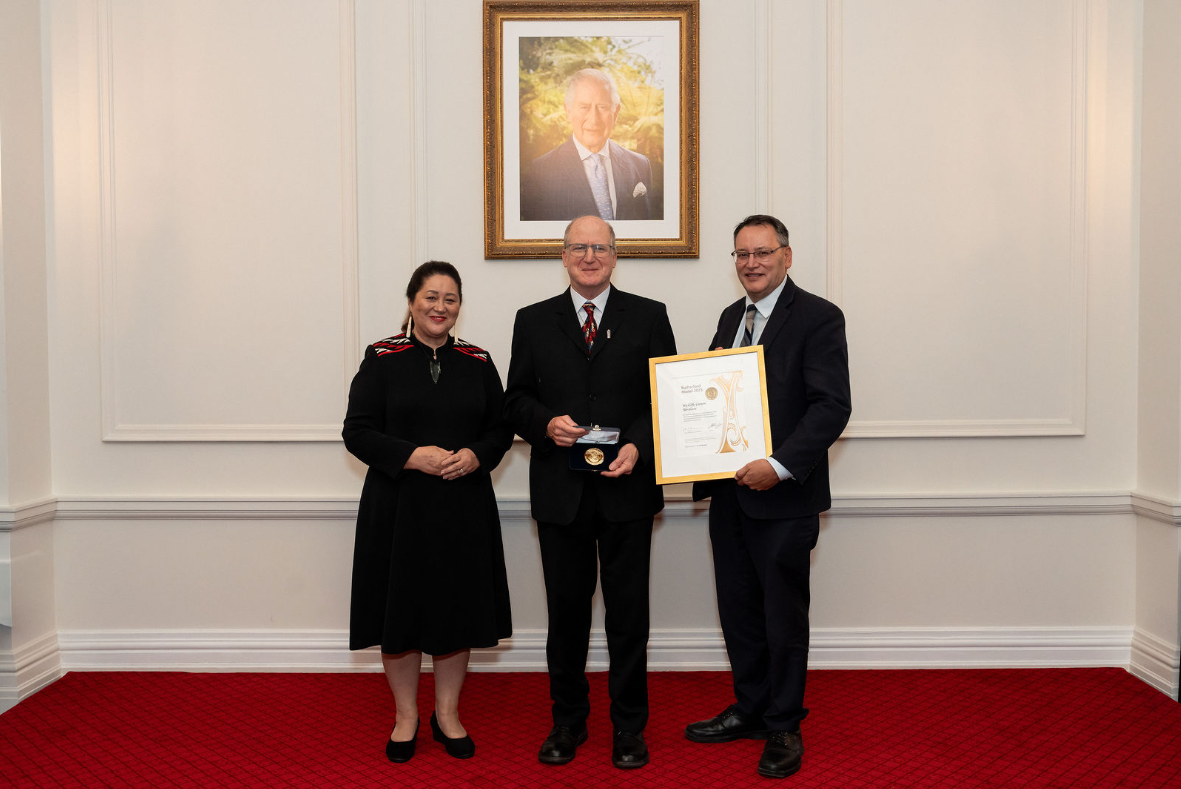
Distinguished Professor Wickliffe Abraham FRSNZ, of Ōtākou Whakaihu Waka – the University of Otago, has been awarded the Rutherford Medal for breakthrough advances in the understanding of the neural mechanisms of memory and for providing inspirational leadership for neuroscience in Aotearoa New Zealand.
Cliff’s fundamental research on synaptic plasticity has advanced understanding of how the plasticity of the brain’s neuronal cells underpins our ability to learn and form long-term memories.
Many of Cliff’s most significant discoveries have been in ‘metaplasticity’, a term he coined. Metaplasticity encompasses many mechanisms in the brain, including the priming of nerve cells for learning when encountering interesting or important new information, while also balancing the levels of neural activity to maintain stability of the brain’s neural networks, optimising their function.
His research is clinically relevant, since evidence suggests that abnormal plasticity and metaplasticity contribute to memory deficits and cognitive impairment. It has informed international research in disciplines as diverse as neuroscience, psychology, computational modelling, and artificial intelligence.
Cliff’s fundamental research, working alongside many colleagues at Otago, has led to identification of a key protein that supports brain plasticity and memory formation. He is now investigating how that protein can be increased in the brain to improve brain function and treat neurological diseases, including Alzheimer’s.
Cliff has provided inspirational leadership in neuroscience, including through establishment of Otago’s Brain Health Research Centre and energising the Australasian Winter Conference on Brain Research over many years. He now co-leads the national Aotearoa Brain Project ‒ Kaupapa Roro o Aotearoa, and is passionate about mentoring and inspiring the next generation of neuroscientists. He genuinely engages with communities, and has promoted inclusive research by, with, and for Māori to help reduce inequities in brain health.
“The metaplasticity story has been an interesting road to travel, and the fact that others have picked it up as well makes it very rewarding.”
– Cliff Abraham
Read media release about this prize >
Awards presented by the Health Research Council of New Zealand
Te Ata Hāpara Award
This award is presented for contribution to the advancement of Māori health through excellent and impactful research as an emerging researcher.
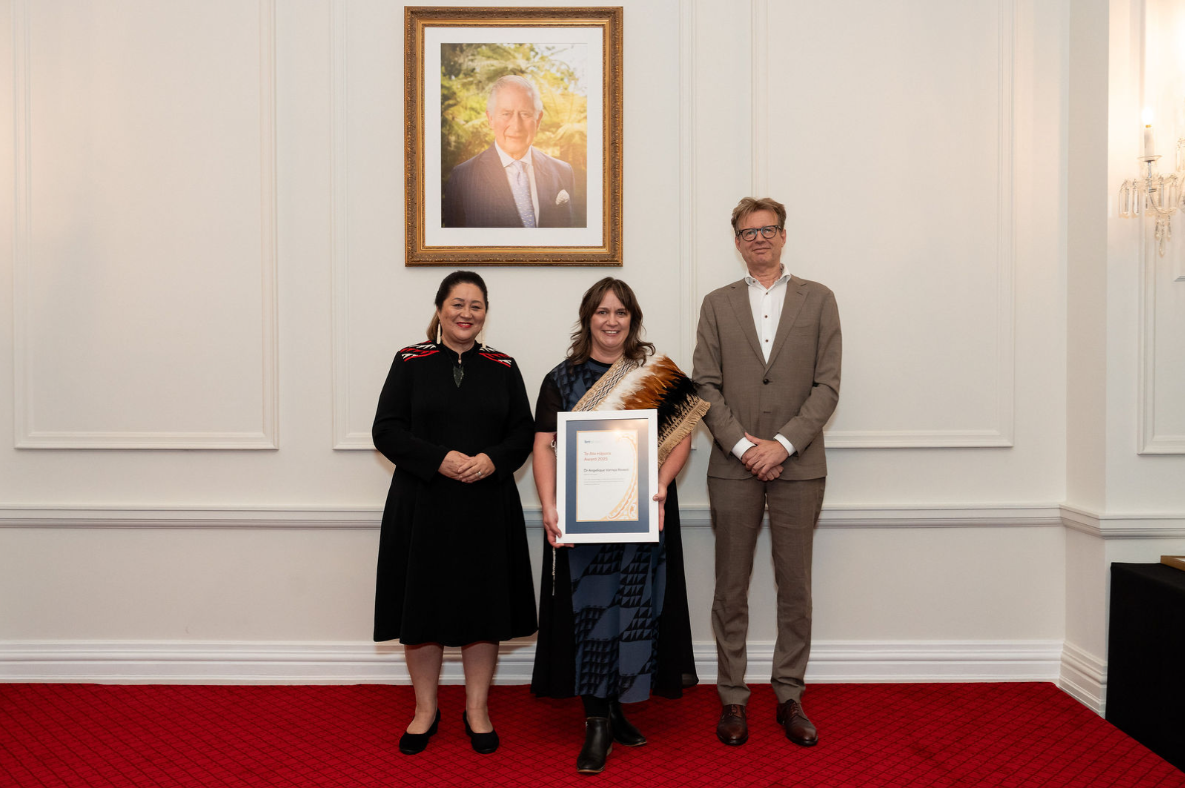
Dr Angelique Reweti, Massey University, has received the inaugural Te Ata Hāpara Award.
Angelique began her academic and research career at age 36, earning a first-class honours degree in Māori health and completing her doctorate in 2022.
The first in her whānau to attend university, Angelique’s journey has been shaped by witnessing first-hand how the health system failed to meet her whānau needs. That experience drives her determination to reclaim Māori ways of knowing and ensure communities are not just participants in research but partners and leaders in defining the issues, generating the evidence and shaping their own solutions.
She works alongside her whānau and hapū through kaupapa Māori research that secures connections to marae and whenua. Through wānanga of reconnection, her work restores identity and belonging, affirming that wellbeing begins with knowing who we are and where we come from. Angelique also co-leads Wāhi Kōrero, an online story sharing platform with over 800 stories that reveal hidden barriers to healthcare, offering vital insights that have directly influenced Te Whatu Ora’s redesign of child growth and development services through Kahu Taurima.
With a focus on elevating whānau voice, Angelique is recognised for her growing leadership in kaupapa Māori research and indigenous health promotion.
2025 Research Honours Aotearoa – Tāmaki Makaurau Auckland, Tuesday 4 November
View photographs from the evening >
Awards presented by the Royal Society Te Apārangi
The Hatherton Award
The Hatherton Award is presented for the best scientific paper by a PhD student in mathematics, or in physical, earth, or information sciences.
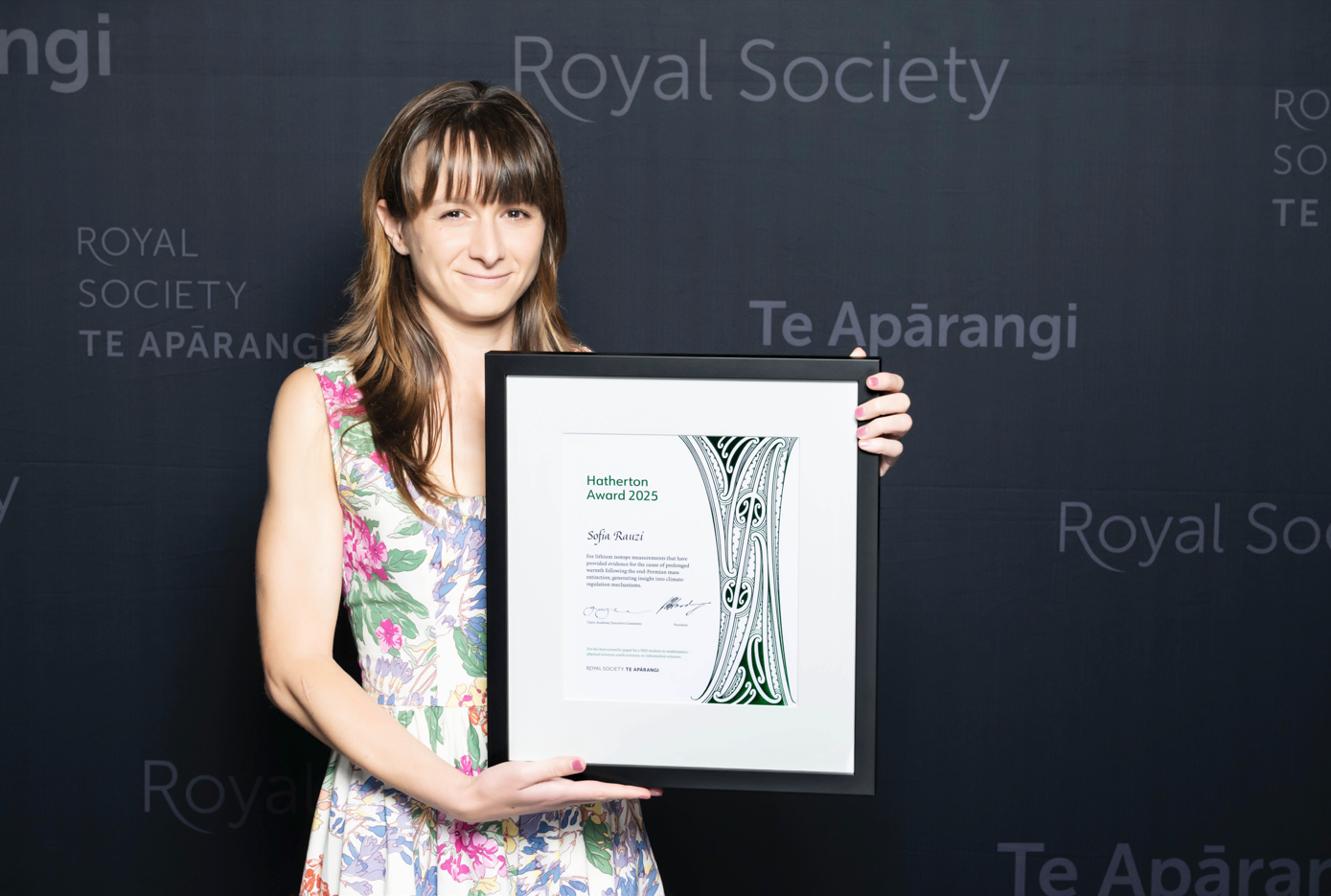
Sofia Rauzi from Te Whare Wānanga o Waikato – the University of Waikato has won the Hatherton Award for her paper that helps to answer a long-standing question about historic climate change through lithium isotopes in sedimentary rocks.
Sofia’s research focused on the puzzle of why, after massive volcanic eruptions in the Permian period caused catastrophic climate change, the high temperatures persisted for 5 million years longer than would be expected.
Sofia’s approach was to assess the ratio of lithium isotopes in marine shales as a proxy for formation of marine clay throughout this warm period.
She used the ratios of lithium isotopes in these marine sediments, together with model simulations, to show that clay formation in the marine environment remained elevated during this period. This elevated clay formation potentially sustained the high temperatures by releasing dissolved carbon dioxide into the atmosphere and slowing the natural processes that remove carbon from the atmosphere.
Sofia says she’s excited to try and reconstruct conditions on Earth millions or billions of years ago.
“You essentially compile as many clues as you can and then try and figure what one tiny aspect of what the planet was like. It feels analytical and creative at the same time.”
– Sofia Rauzi
Read media release about this prize >
The Fleming Medal
The Fleming Medal is presented for distinction in the protection, maintenance, management, improvement, or understanding of the New Zealand environment.
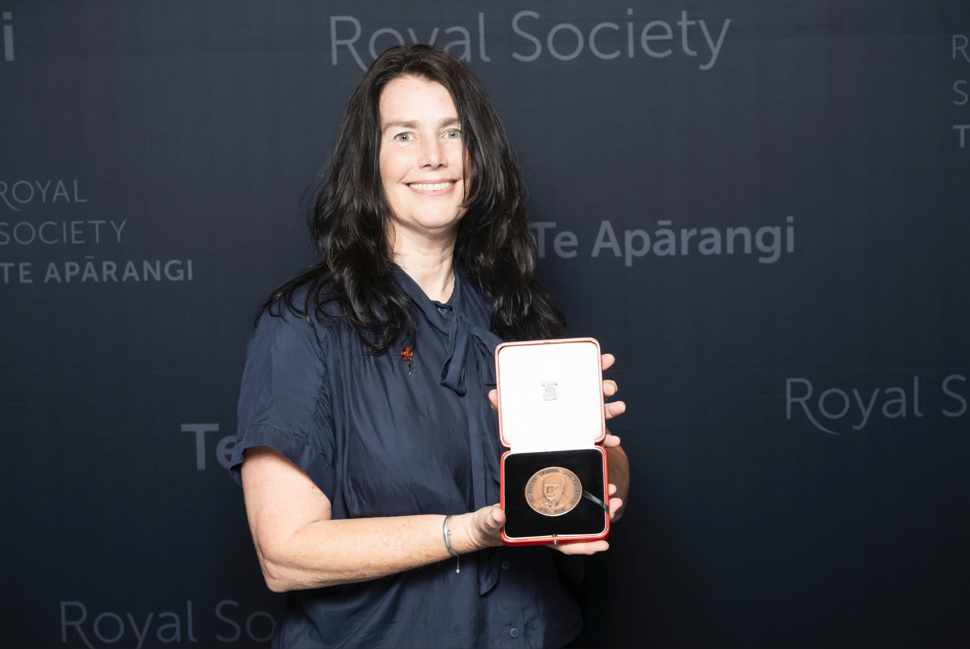
Professor Rochelle Constantine ONZM, of Waipapa Taumata Rau – the University of Auckland, has been awarded the Fleming Medal for pioneering research and collaborations that have driven sustainable solutions to protect endangered marine species and their habitats.
A marine ecologist and conservation biologist, Rochelle has led multidisciplinary teams studying endangered marine species – whales and dolphins in particular.
Rochelle studies large marine animals, including their behaviour, movement, ecology, and population dynamics. She uses novel technology including high-resolution tags, satellite telemetry, drones, and machine learning tools to understand multi-species marine communities.
She communicates her evidence widely to guide research-informed decision making to protect taonga species locally and internationally.
Data from her research on Bryde’s whale has informed the decision to reduce speed for ships traveling through the Hauraki Gulf, which has reduced mortality for these critically endangered whales. Rochelle has led research on the world’s rarest marine dolphin, the Māui dolphin, which has helped to protect this iconic species from overfishing and to understand their chance of recovery.
Rochelle advises international bodies on how to protect marine mammals in the Southern and Pacific Oceans.
“We are ocean people; our ocean space is 14 times larger than our landmass, but we don’t value it like we should.”
– Rochelle Constantine
Read media release about this prize >
Te Rangi Hiroa Medal
Te Rangi Hiroa Medal is presented for outstanding work in social history, cultural diversity, socioeconomics, or medical anthropology.
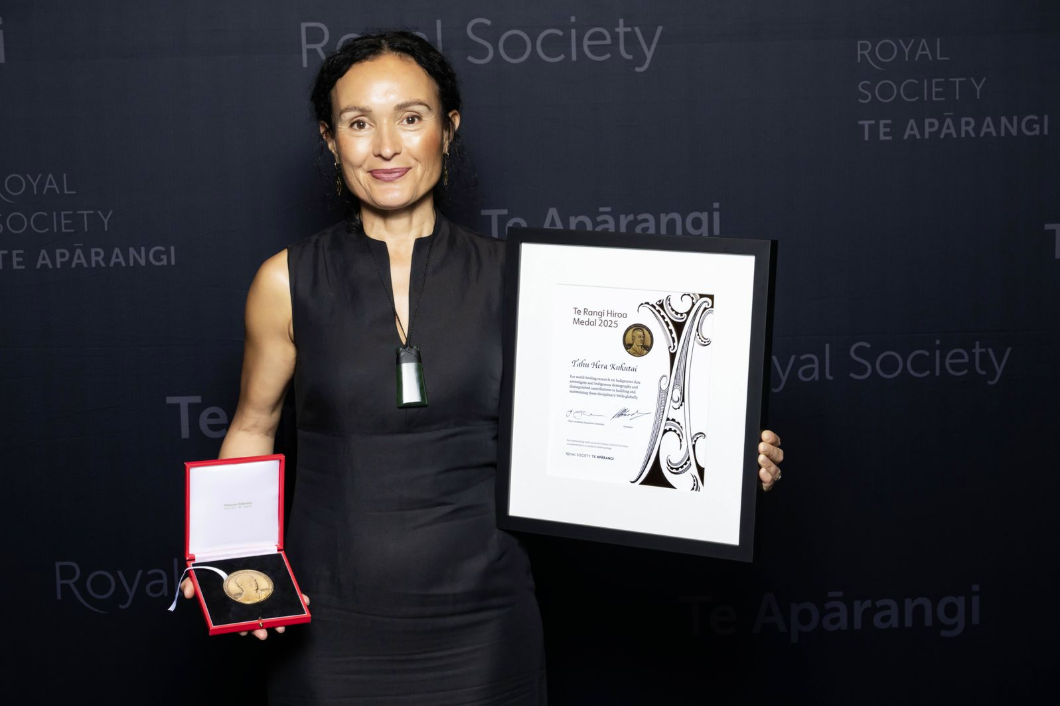
Professor Tahu Kukutai FRSNZ (Ngāti Tīpā, Ngāti Mahanga, Ngāti Kinohaku, Ngāti Ngawaero, Te Aupōuri), of Te Whare Wānanga o Waikato – the University of Waikato, has been awarded Te Rangi Hiroa Medal for world-leading research on Indigenous data sovereignty and Indigenous demography, and for distinguished contributions to these disciplines globally
Combining sociological theory and demographic methods, Tahu has been able to use large datasets to explore social and economic issues, including wellbeing for Māori communities.
She co-edited the first scholarly work to develop the concept of Indigenous data sovereignty. This has been globally influential, informing practical applications to avoid harmful use of data and enabling communities to contribute to and benefit from their own data.
Tahu has published widely on Māori demography and ethnic identity. She is known internationally for her work on census methodologies and state practices of ethnic and racial classification. She is committed to sharing her expertise to raise awareness of the importance of data and demography.
“Data is a taonga. And if you have a taonga, it's really important that you be the best kaitiaki that you can be.”
– Tahu Kukutai
Read media release about this prize >
The Durie Medal
The Durie Medal is presented to New Zealand’s pre-eminent social scientist, recognising research that has had both national and international impact.
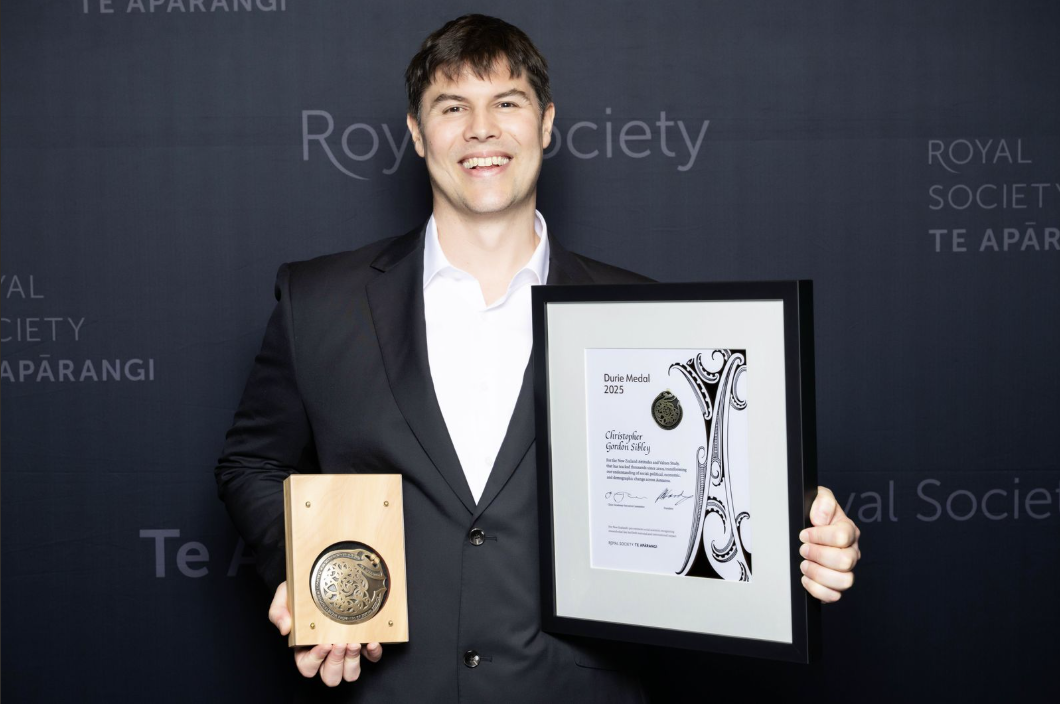
Professor Chris Sibley of Waipapa Taumata Rau – the University of Auckland has won the Durie Medal for his achievements in political and social psychology, including the New Zealand Attitudes and Values Study (NZAVS).
For more than 16 years, Chris has run this national longitudinal study, which tracks the evolving perspectives of more than 70,000 New Zealanders on health, personality, relationships, employment, values, beliefs, and habits.
This landmark project has captured watershed moments in our history, from the Christchurch mosque attacks to the Covid-19 pandemic.
His research output is prolific, and he has published in leading journals and edited reference books in social psychology. He collaborates widely and has mentored many students. His work has informed policies in areas such as reducing prejudice and discrimination, and monitoring societal trends in health, wellbeing, and societal engagement.
“My vision is to continue to track change in New Zealand society over time, and to provide an independent, scientific dataset that researchers can use to understand how New Zealand society has changed.”
– Chris Sibley
Read media release about this prize >
The MacDiarmid Medal
The MacDiarmid Medal is presented for outstanding scientific research that demonstrates the potential for application to human benefit.
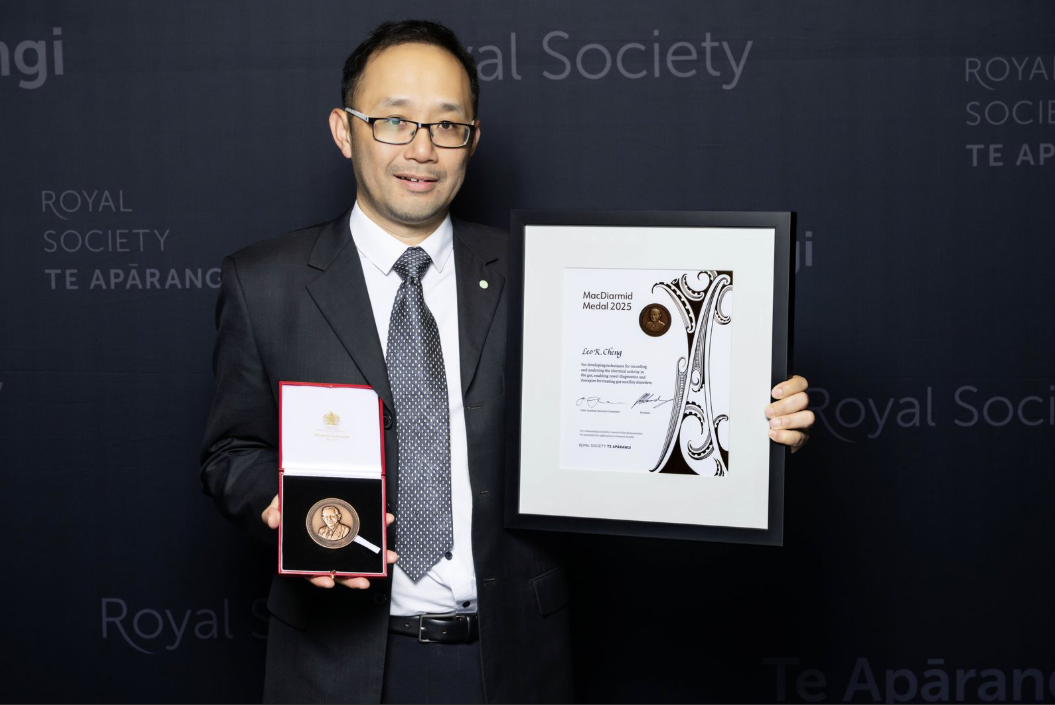
Professor Leo Cheng, of Waipapa Taumata Rau – the University of Auckland, has been awarded the MacDiarmid Medal for developing techniques to record and analyse electrical activity in the body, enabling new ways to diagnose and treat gut-motility disorders.
He has combined mathematical modelling with experimental research to improve our understanding of the electrical patterns that coordinate the contractions in the gut, heart, and uterus.
Contractions in the gastrointestinal system are coordinated by electrical signals, and if these signals become disordered, patients can experience debilitating symptoms like persistent nausea and vomiting.
Leo has developed novel bioengineering techniques to record and map electrical activity in the stomach and other regions of the gut in high resolution.
His results have informed clinical practice through identification of biomarkers that enable non-invasive diagnostic methods.
He has also led development of technical advances that have enabled the development of new therapies for gut-motility disorders. Treatments that are currently being developed and trialled include gastric electrical pacing and ablation.
"My grand vision is for gut-motility disorders to be diagnosed and treated as accurately and efficiently as cardiac disorders."
– Leo Cheng
Read media release about this prize >
The Hector Medal
The Hector Medal is presented for outstanding work which has advanced the chemical, physical, mathematical, or information sciences.
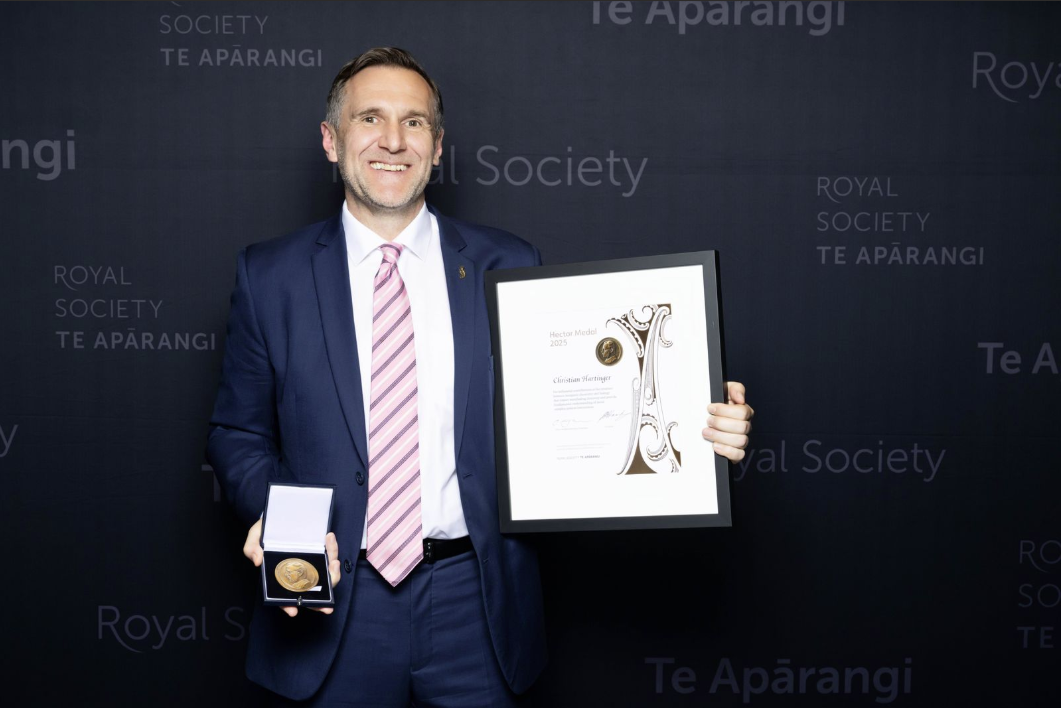
Professor Christian Hartinger FRSNZ, of Waipapa Taumata Rau – the University of Auckland, has been awarded the Hector Medal for fundamental research at the interface of chemistry and biology that has advanced our understanding of the interactions between metal complexes and biomolecules such as proteins, with potential applications in medicine and industry.
Most synthetic metal complexes used in medicine form bonds indiscriminately with proteins and other biomolecules. Christian’s innovative research has explored the interactions between metal complexes and biomolecules, enabling identification of the specific protein targets of metal-based drugs.
Using the fundamental knowledge gained, his team develops novel metal-based chemotherapy agents to selectively kill cancer cells by targeting key proteins. These metal-based anticancer agents can have multiple biological targets, and Christian’s group designs such compounds with the aim of increasing effectiveness and reducing drug resistance.
"We celebrate when researchers make fundamental discoveries that eventually lead to applications, but we need to make these discoveries first."
– Christian Hartinger
Read media release about this prize >
The Callaghan Medal
The Callaghan Medal is awarded for an outstanding contribution to communicating science technology, or both, and raising public awareness of its value.
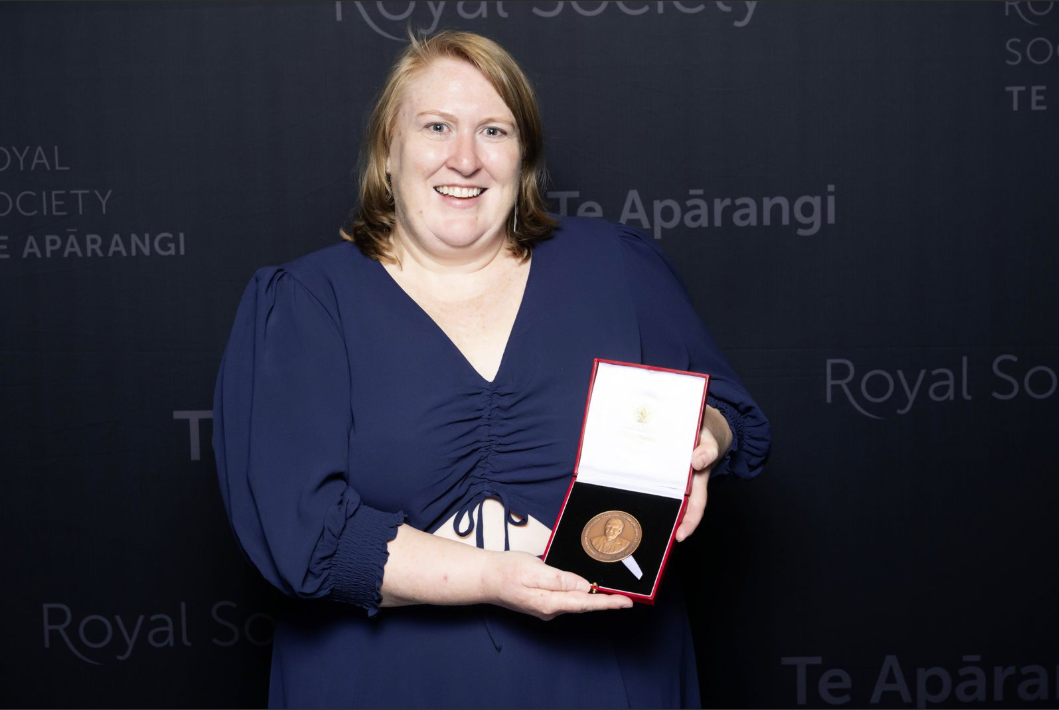
Professor Margaret Stanley of Waipapa Taumata Rau – the University of Auckland has won the Callaghan Medal for her outstanding contribution to science communication and raising public awareness of the value of science.
Margaret is an accomplished ecologist who has focused on sharing her passion that science and research can deliver benefits in the real world –beyond academic citations. She has published many articles and opinion pieces to contribute to informed public debate on conservation science.
Margaret has become a ‘go-to’ presenter on conservation issues. She has been invited to speak at many high profile and community events and to diverse audiences in all kinds of formats, including radio, TV, and online discussions. She regularly engages with communities to simplify technical advice and empower people to make evidence-based decisions. She has run science communication workshops in New Zealand and internationally and helps early-career researchers develop skills and confidence.
"We all do better when we’re connected to our local environment – and we have a lot to protect in Aotearoa. Most of our species are found nowhere else in the world – it makes us unique."
– Margaret Stanley
Read media release about this prize >
The Thomson Medal
The Thomson Medal is awarded for outstanding contributions to the organisation, support, and application of research in science, technology, or the humanities.
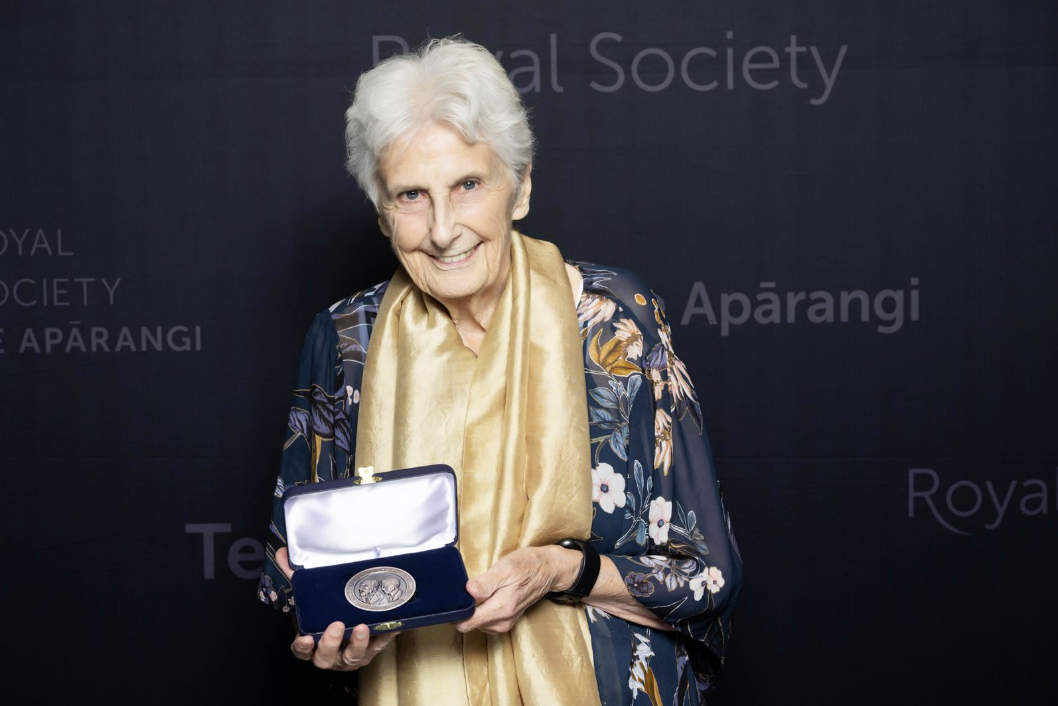
Emeritus Professor Carolyn (Kim) King FRSNZ of Te Whare Wānanga o Waikato – the University of Waikato has won the Thomson Medal for her five decades as a researcher, author, editor, historian, and lecturer in zoology and ecology.
Kim is a world authority on small mammals – especially stoats and weasels – both as invasive pests and as valued natives.
Her research has advanced our understanding of factors that control the sizes of their populations and informed strategies for pest management. In addition to her many scientific papers, she has shared her knowledge through eight books. Her popular science books are highly accessible to the general public, and she has spoken to many communities to promote engagement in conservation of New Zealand's ecosystems.
Kim has edited all three editions of the Handbook of New Zealand Mammals with Oxford University Press, along with several other reference texts. She also edited two of the Society’s scientific journals over a total of 33 years.
“We can admire stoats, even whilst at the same time trying to mitigate the damage they do to native biodiversity.”
– Kim King
Read media release about this prize >
Awards presented by the Health Research Council of New Zealand
Beaven Medal
The Beaven Medal is awarded for medical research that has been translated into improvements in clinical practice and benefits for the health of patients.
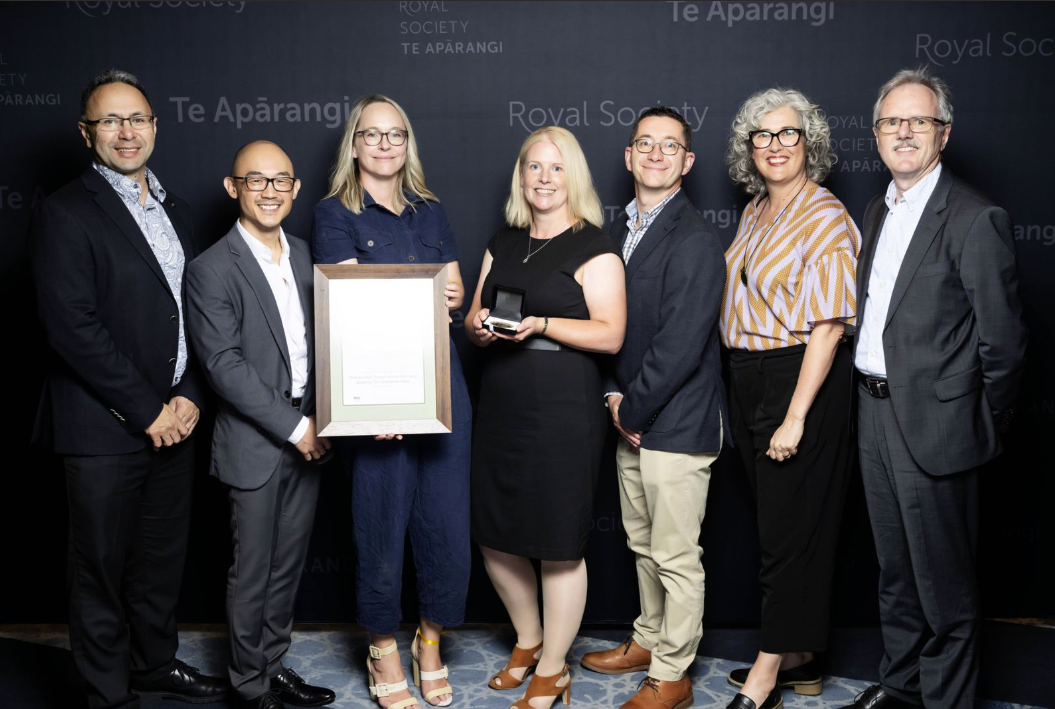
Two Beaven Medals are being awarded this year. The second recipient is Professor Alice Theadom and the Brain Injury Screening Tool Development Group from Te Wānanga Aronui o Tāmaki Makau Rau – the Auckland University of Technology.
About 35,000 mild traumatic brain injuries occur in New Zealand every year. Professor Alice Theadom leads a group which developed a free screening tool to help clinicians identify people aged 8 years and over who are at risk of a poor recovery following a mild traumatic brain injury such as concussion.
By identifying children and adults at risk, and facilitating early referral, the tool has significantly improved patient-care pathways in both primary care and hospital emergency departments throughout New Zealand. Clinicians are now much more confident and consistent when assessing and managing patients with mild traumatic brain injury.
The time it takes for a patient to get their first appointment for concussion services has reduced from 55 to 17 days, while the proportion of people receiving follow-up in accordance with international guidelines has improved from 36% to 51%.
Te Tohu Rapuora Medal
Te Tohu Rapuora Medal is awarded for researchers who have developed leadership, excellence, and a contribution to advancing Māori health and knowledge.
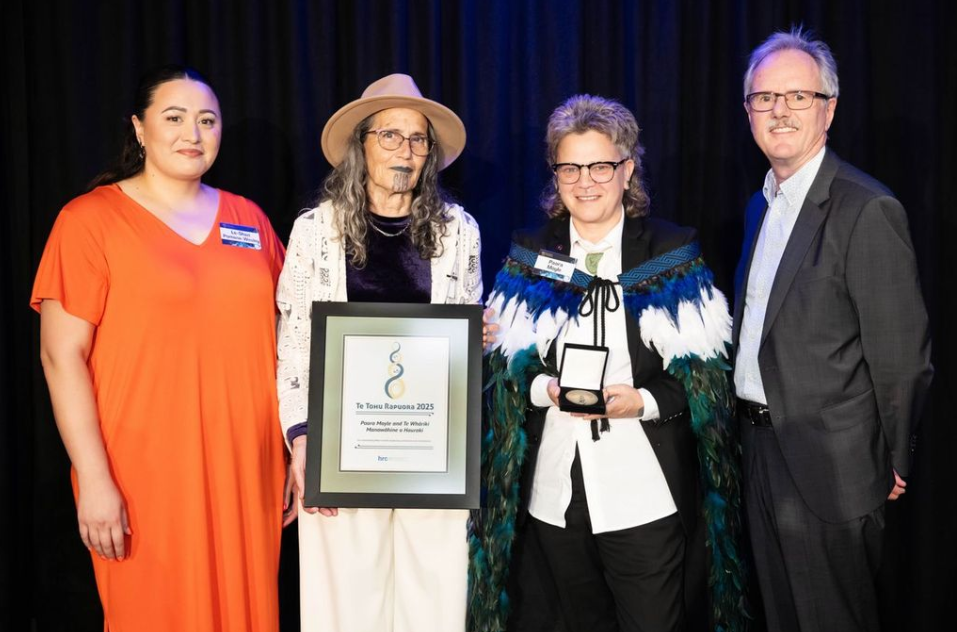
Paora Moyle KSO and Te Whāriki Manawāhine o Hauraki have been awarded Te Tohu Rapuora Medal.
Independent whānau refuge, Te Whāriki Manawāhine o Hauraki, has been servicing diverse communities across the Hauraki region for 40 years.
With funding support from the Health Research Council, and strategic vision from the Te Whāriki Board, social worker and researcher Paora Moyle led the development of a kaupapa Māori research unit at Te Whāriki that has gathered the lived experiences of wāhine Māori, takatāpui, gang whānau, and survivors of harm in state care.
The dedicated work of the Te Whāriki team in the community supports innovative, inclusive research using original methods such as waha pikitia (visual storytelling). Their landmark research programme – 'Hauraki Whānau Voices' – has informed initiatives to improve housing health. The He Whare, He Taonga study documented the relationship between housing vulnerability and family violence for wāhine Māori in Hauraki. The research also informed the delivery of 20 two-bedroom cabins to isolated communities affected by Cyclone Gabrielle.
This community-led research directly addresses needs at the coalface and has significantly advanced Māori health knowledge, influencing social policy development and community projects throughout Aotearoa.
2025 Research Honours Aotearoa – Ōtautahi Christchurch, Tuesday 28 October
View photographs from the evening >
Awards presented by the Royal Society Te Apārangi
The Humanities Aronui Medal
The Humanities Aronui Medal is presented for research or innovative work of outstanding merit in the humanities.
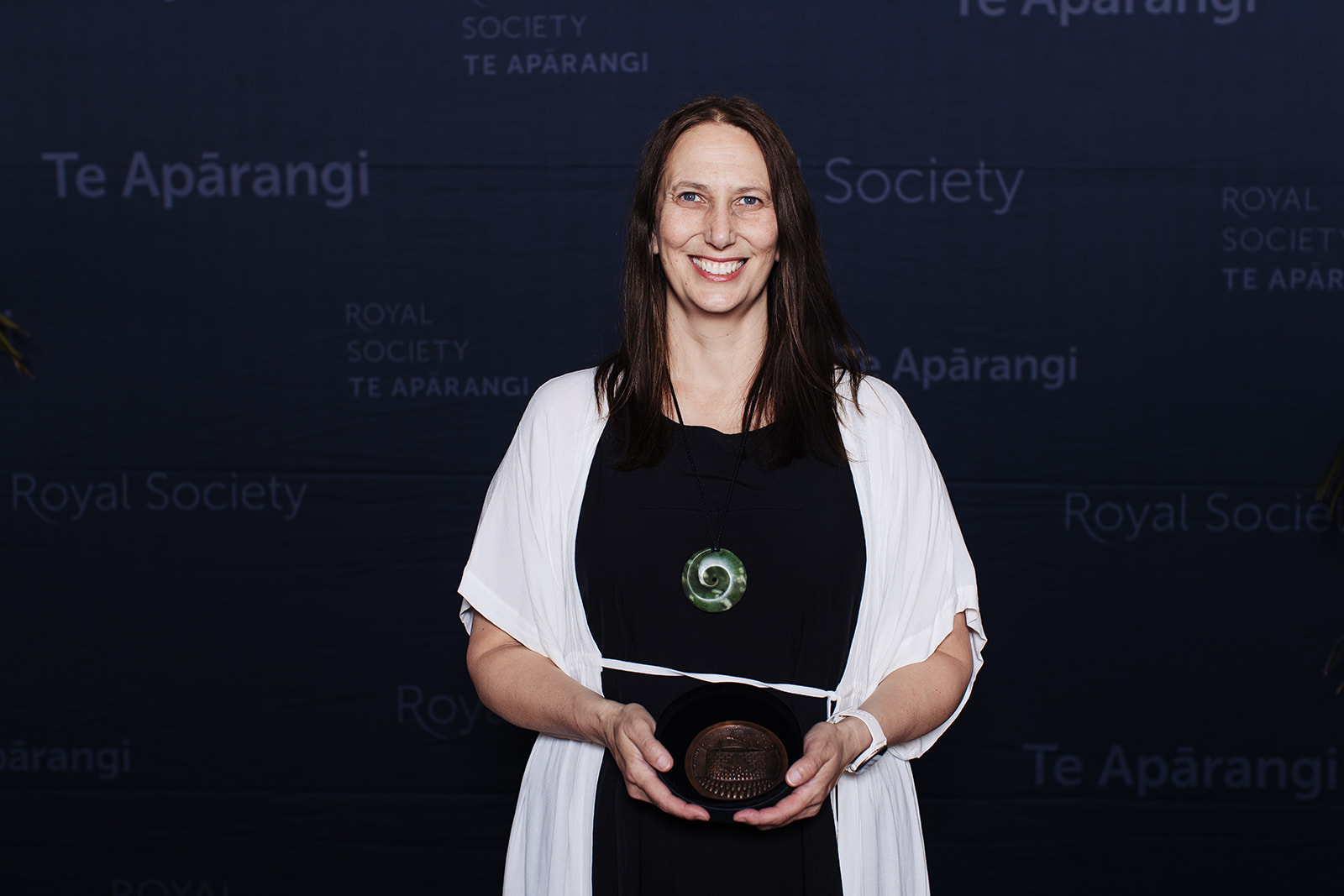
Distinguished Professor Jacinta Ruru MNZM FRSNZ (Raukawa, Ngāti Ranginui), of Ōtākou Whakaihu Waka – the University of Otago, has been awarded the Humanities Aronui Medal for internationally acclaimed research on how colonial legal systems ought to recognise Indigenous peoples’ interests in land and water.
As a legal scholar, Jacinta has written or co-authored many books, including Discovering Indigenous Lands: The Doctrine of Discovery in the English Colonies. Her groundbreaking ideas are shaping legal interpretations of the rights and responsibilities of Indigenous peoples around the world.
Within Aotearoa New Zealand, Jacinta’s work focuses on how law and policy can uphold Te Tiriti o Waitangi by enabling Māori to care for, own, and manage lands and waters. She has advanced innovative options including granting legal personhood to natural features such as mountains and rivers. She also successfully campaigned for inclusion of tikanga Māori into the teaching at all New Zealand law schools.
Beyond the law, Jacinta has contributed to the broader research sector, supporting and mentoring many Māori scholars and promoting development of research capability and infrastructure as Co-director of the Centre of Research Excellence Ngā Pae o te Māramatanga. She has also coedited anthologies including Ngā Kete Mātauranga: Māori Scholars at the Research Interface and Books of Mana: 180 Significant Māori Non-Fiction Books.
“I’ve always been really interested in how our modern legal system can recalibrate to reflect modern values of reconciliation with iwi Māori.”
– Jacinta Ruru
Read media release about Jacinta's prize>
Te Rangaunua Hiranga Māori Medal
Te Rangaunua Hiranga Māori Medal is awarded every two years for excellent and innovative research, co-created in community contexts by Māori, that has made a distinctive contribution to community wellbeing and development in Aotearoa New Zealand.
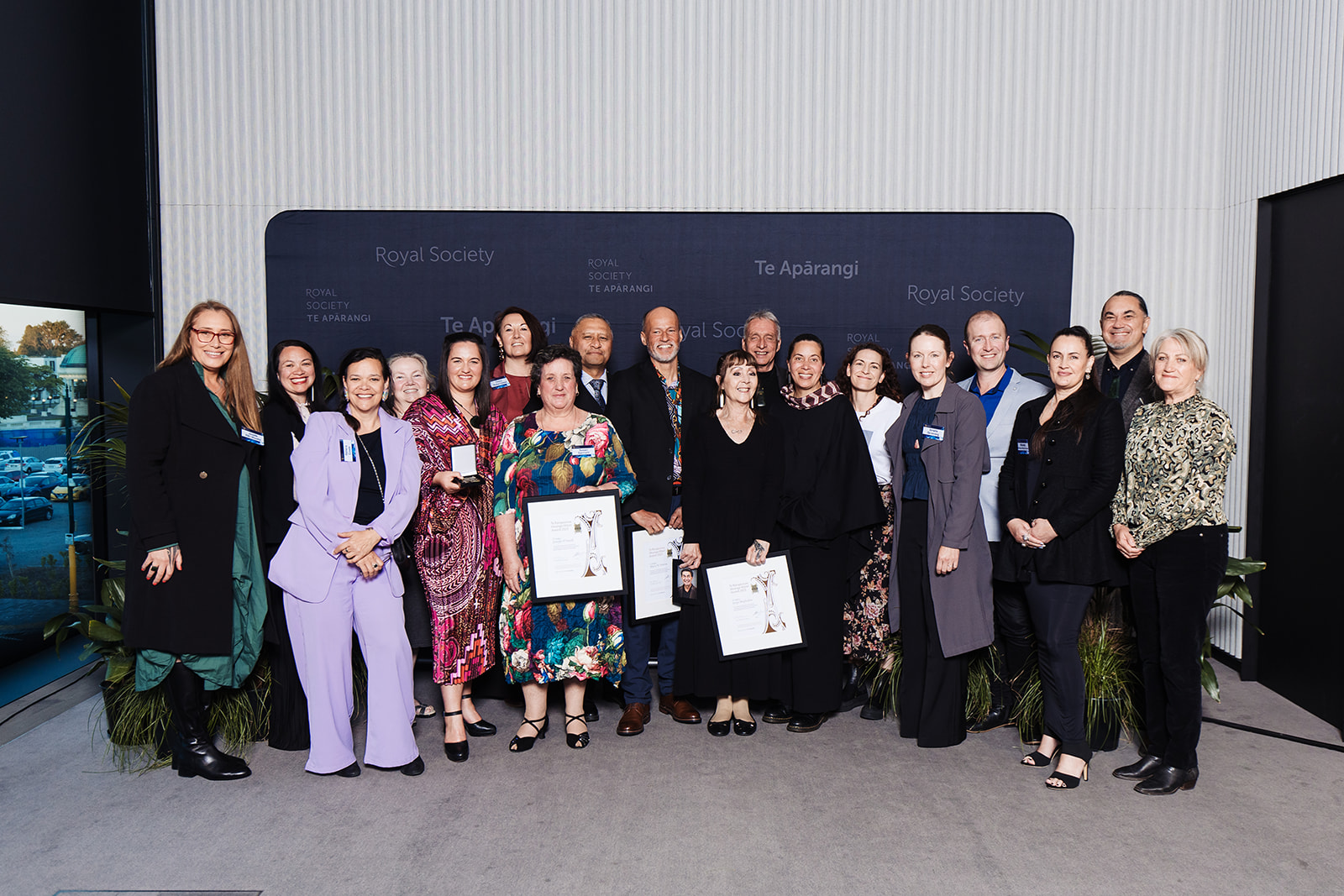
Te Kāhui-a-Te-Rū-Rangahau, of the School of Teacher Education at Te Whare Wānanga o Waitaha – the University of Canterbury, has won the Te Rangaunua Hiranga Māori Medal for co-creating guides to enable culturally responsive teaching in Aotearoa New Zealand.
The Hikairo Schema book series and its tertiary companion volume, Ngā Hau e Whā o Tāwhirimātea, were created by Te Kāhui-a-Te-Rū-Rangahau with and for kaiako teachers. The guides provide developmentally appropriate, evidence-based strategies to inform teaching practice.
The Hikairo Schema books are designed to support teaching at early childhood, primary, intermediate, and secondary stages. They have been widely used in Aotearoa New Zealand (as part of the Better Start literacy approach) and internationally.
Ngā Hau e Whā o Tāwhirimātea is an open-access publication that has been designed for use in undergraduate and postgraduate teaching.
The problem the resources seek to solve is “filling the void that exists between the theory and practice”.
“The resources fill the void that exists between theory and practice by providing practical examples that enable teachers and educators to apply their new knowledge in non-threatening and mana-enhancing ways.”
– Sonja Macfarlane
Read media release about this prize >
Scott Medal
The Scott Medal is awarded every two years for an outstanding contribution to the advancement of engineering sciences and technologies and their application.
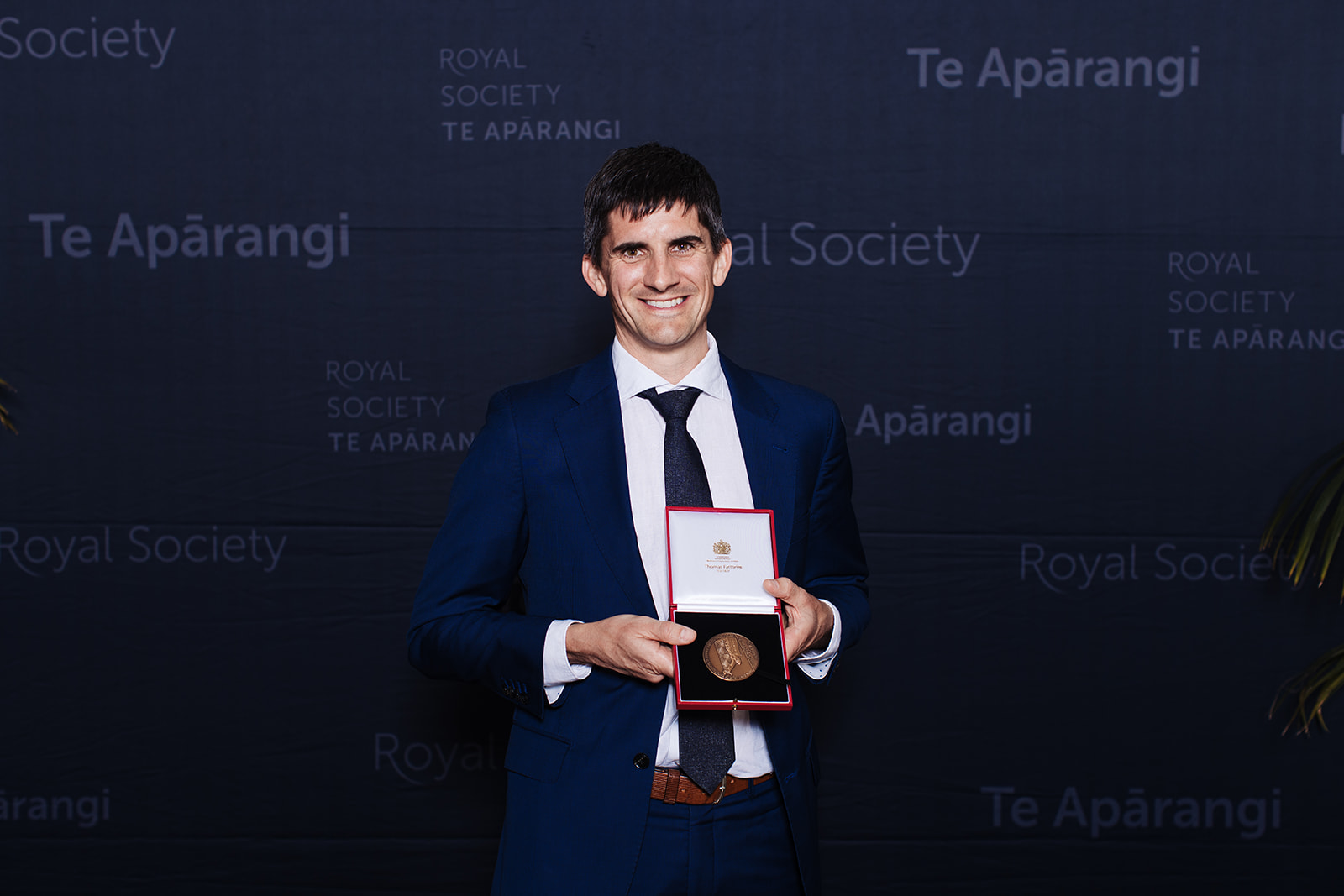
Professor Brendon Bradley FRSNZ of Te Whare Wānanga o Waitaha – the University of Canterbury has won the Scott Medal for pioneering research in earthquake science and engineering, and for translating these findings to advance seismic resilience in New Zealand and internationally.
Brendon has pioneered new methods for ground-motion simulation which can identify areas that will experience the strongest earthquake shaking. His models use massive datasets, including the geological and geophysical properties of rock and soil at specific locations. This approach allows earthquake-strengthening efforts to be prioritised in vulnerable areas and where failure would be critical, resulting in more resilient buildings and infrastructure, while managing the costs.
Brendon has co-authored a landmark textbook on seismic hazards and risk analysis and was a major contributor to the 2022 update of our National Seismic Hazard Model that forecasts the likelihood of ground-shaking around the country and informs the design standards for all civil construction.
Brendon co-established QuakeCORE as a centre of research excellence, serving as a director for 9 years. He also displayed leadership in communicating lessons from the 2010–11 Canterbury and 2016 Kāikoura earthquakes – not only in Aotearoa but around the world.
“My vision for earthquake engineering is a future where quakes are just nuisances – people feel the shaking but generally resume life immediately, to a much greater extent than presently.”
– Brendon Bradley
Read media release about Brendon's prize >
Pickering Medal
The Pickering Medal is awarded for innovation and excellence in technology that has generated significant impact and commercial success both nationally and internationally.
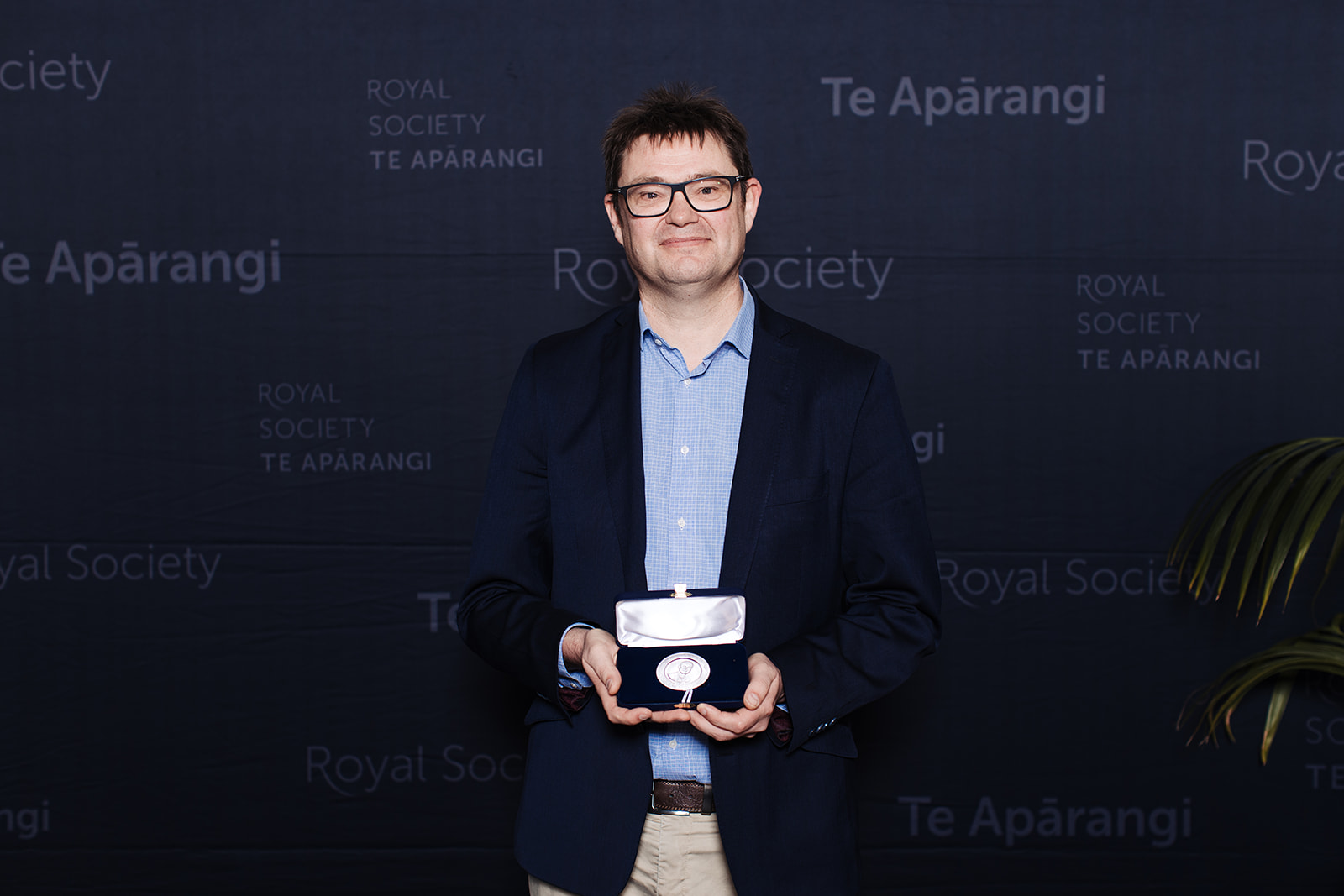
Professor Aaron Marshall, of Te Whare Wānanga o Waitaha – the University of Canterbury and the MacDiarmid Institute, has been awarded the Pickering Medal for pioneering research in electrochemistry and for successfully commercialising sustainable technologies.
Electrochemistry uses electricity to control or drive chemical reactions at the surface of electrodes. Aaron uses a mix of fundamental research, thermodynamic modelling and engineering know-how to identify the optimal conditions to minimise emissions and operating costs of industrial electrochemistry. Aaron has focused his efforts on high-value problems with commercially viable solutions, and has founded two spin-out companies that are each valued at tens of millions of dollars.
Zincovery offers the world’s first low-carbon pure zinc, recycled from steel-industry waste. The company's innovative technology separates the zinc from the toxic waste, generating 95% less emissions with 45% lower operating costs than the conventional process. Zincovery is building a facility in New Zealand to produce ultra-high purity zinc.
Ternary aims to enable zero-emission transport by using a novel liquid that effectively stores electricity. Importantly the liquid can be stored and delivered using existing fuel infrastructure, then recharged after use, creating a completely circular renewable energy system. Aaron conceived the electrocatalytic pathway to efficiently harness energy from the liquid feedstock.
“I think the future’s really bright when we can take fundamental science and combine it with technologies, like electrical engineering, to solve real-world problems.”
– Aaron Marshall
Read media release about Aaron's prize >
Awards presented by the Health Research Council of New Zealand
Catalyst in the Community Award
The Catalyst in the Community Award is presented for accelerating translation of research findings to improve health outcomes in partnership with the community.
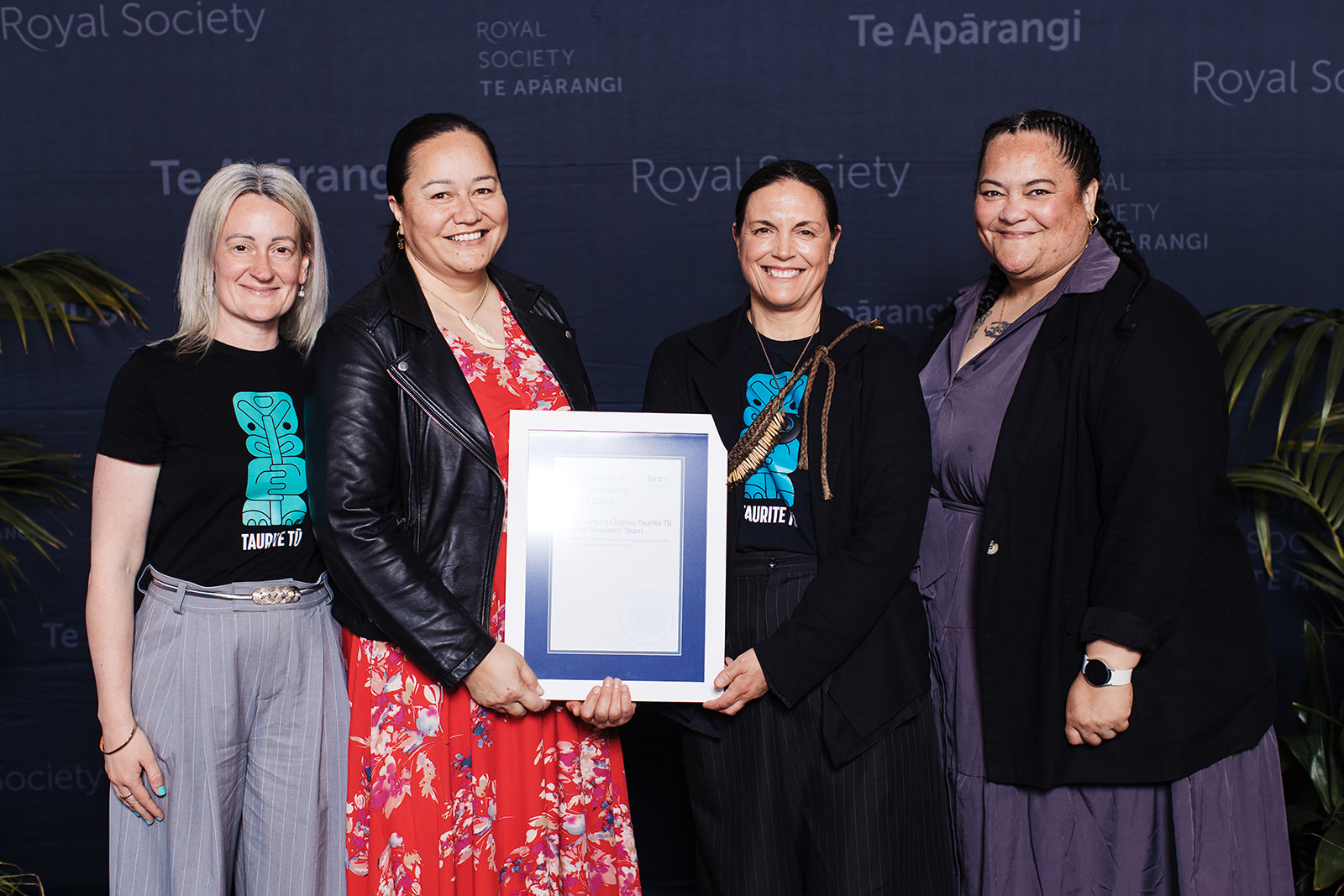
The inaugural winner of the Catalyst in the Community Award is the research team from Te Rūnanga o Ōtākou Taurite Tū Limited.
Te Rūnanga o Ōtākou Taurite Tū, a rūnaka-based, kaupapa Māori research unit led by pioneering Māori physiotherapist and researcher Katrina Pōtiki Bryant, has built a robust research programme blending physiotherapy, mātauranga Māori movement practices, kaumātua engagement, and public health expertise.
The team’s Taurite Tū programme, a uniquely Māori approach to falls prevention, rooted in both western science and traditional Māori practices, stemmed from a Health Research Council Ngā Kanohi Kitea community grant and has significantly reduced falls risk and injury rates for Māori aged 55-plus.
There are now 28 Taurite Tū programmes being delivered by iwi-based organisations in largely rural communities across New Zealand, with more coming on board with the support of partnerships with ACC and WellSouth.
Recently taking out the Conporto Health Best Senior Health Service category at the New Zealand Primary Healthcare Awards, Taurite Tū has upskilled many communities in healthcare delivery, with kaumātua engagement and feedback at the heart of all it does.
Beaven Medal
The Beaven Medal is awarded for medical research that has been translated into improvements in clinical practice and benefits for the health of patients.
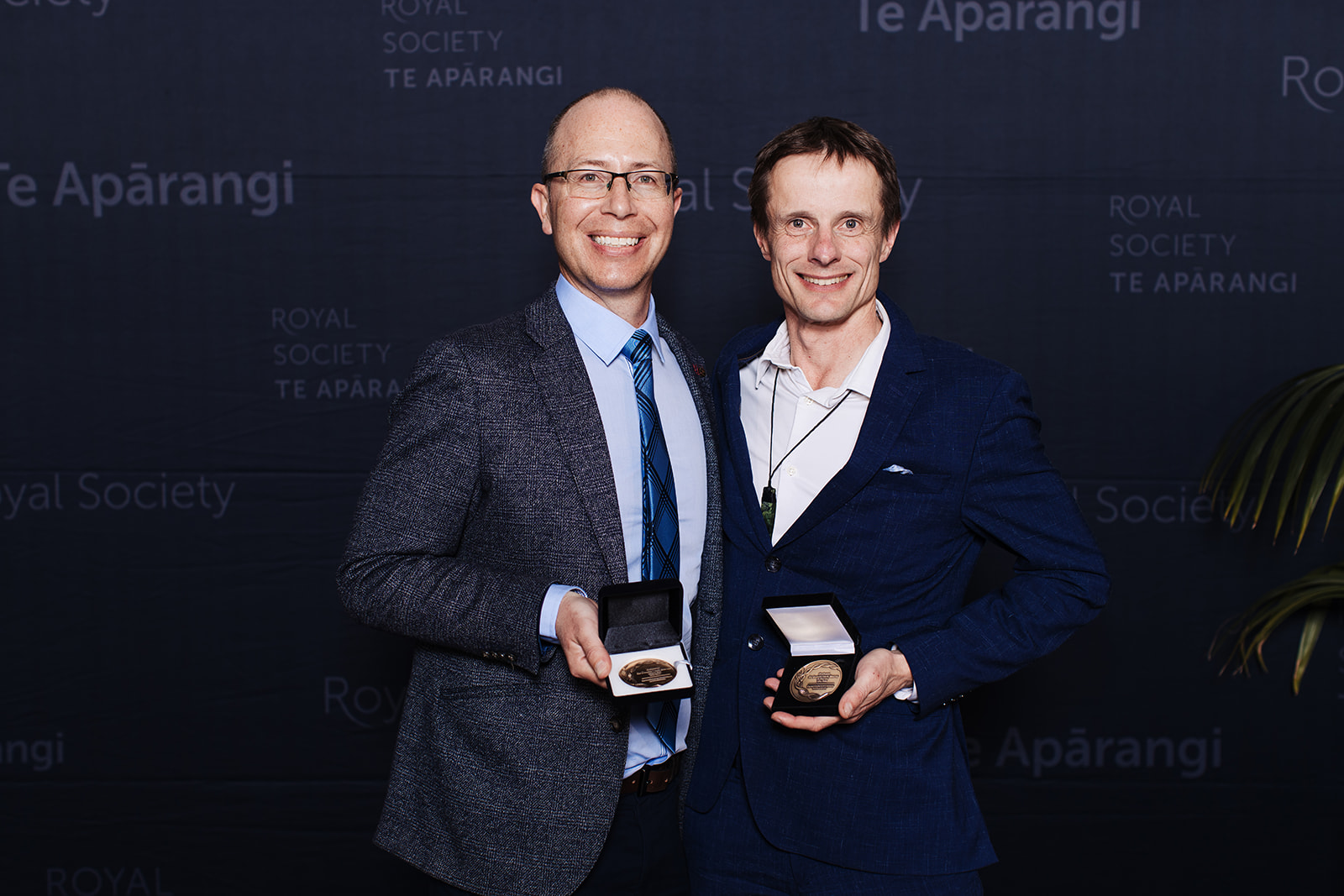
Two Beaven Medals are being awarded this year. The first was presented to Professor Ben Wheeler and Associate Professor Martin de Bock, and their team from Otakou Whakaihu Waka – the University of Otago.
The collective efforts of this team, spearheaded by Ben and Martin, have transformed diabetes care in New Zealand and influenced global practice.
Their research and collaborations with industry have directly driven the nationwide adoption of automated insulin delivery and continuous glucose monitoring, with Pharmac announcing full funding of these technologies for all New Zealanders living with type 1 diabetes in October 2024.
This landmark achievement was underpinned by the team’s research and advocacy, in partnership with Diabetes New Zealand and the diabetes community.
Their clinical trials and contribution to international guidelines have helped make automated insulin delivery the gold standard globally for treating type 1 diabetes.
In many New Zealand clinics, more than 90 percent of children with type 1 diabetes are now using automated insulin-delivery pumps, vastly improving their quality of life and long-term health outcomes. The team have ongoing work trying to achieve this same goal for all New Zealanders living with type 1 diabetes regardless of age or region.
Liley Medal
The Liley Medal is awarded for an outstanding contribution to health and medical sciences that has delivered significant breakthroughs not only in New Zealand but internationally.
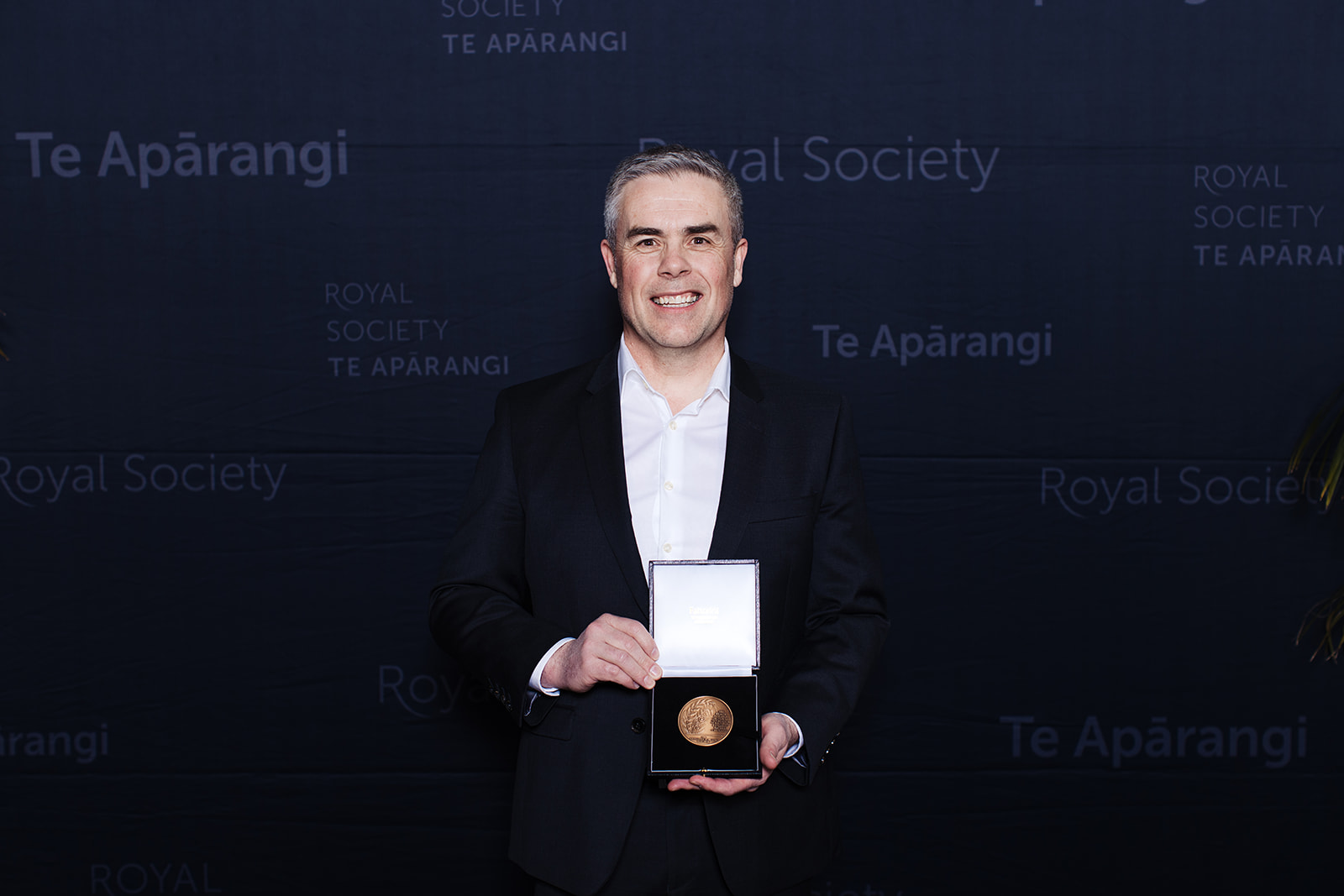
Professor Logan Walker from Otakou Whakaihu Waka – the University of Otago, Christchurch has been awarded the Liley Medal.
RNA splicing occurs during gene transcription and is essential for the proper expression of genes. When something goes wrong with this process, diseases can result.
Professor Logan Walker was lead author on a paper, published in the American Journal of Human Genetics, that has helped integrate complex RNA splicing biology into practical clinical recommendations that are now being used by major diagnostic laboratories in New Zealand and internationally.
The new framework he has helped develop for incorporating RNA-splicing evidence into the clinic has enabled laboratories to classify genetic variants with greater confidence, improving diagnostic rates and enabling earlier clinical interventions.
It has also reduced dependence on population-specific data, contributing to more equitable health outcomes, and reduced the need for expensive and prolonged clinical follow-up, directly benefitting the healthcare system.
